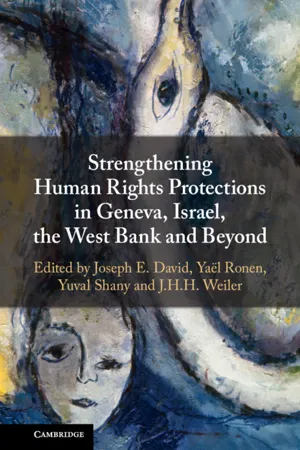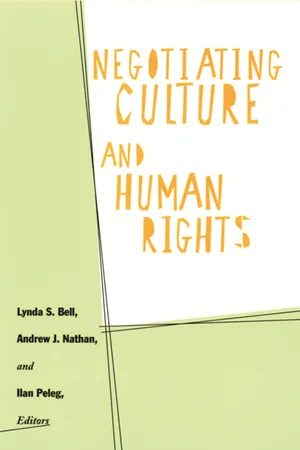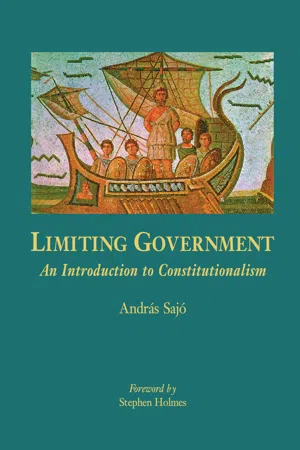Law
Limitations of human rights
Limitations of human rights refer to the restrictions placed on certain rights and freedoms to protect the rights of others or for the greater good of society. These limitations are often necessary to balance conflicting rights and interests, such as national security, public order, and public health. They are typically outlined in legal frameworks and international human rights instruments.
Written by Perlego with AI-assistance
Related key terms
1 of 5
3 Key excerpts on "Limitations of human rights"
- Joseph E. David, Yaël Ronen, Yuval Shany, J. H. H. Weiler(Authors)
- 2021(Publication Date)
- Cambridge University Press(Publisher)
1 On Limits and Restrictions of Human Rights A Systematic Attempt The chapter tries to establish a systematic framework which allows us to structure the examination of human rights cases by indicating the neces- sary legal components and putting these elements in their proper place and in context to each other. Substantive human rights guarantees as, e.g., enshrined in the International Covenant on Civil and Political Rights or the European Convention, cannot be fully understood without taking account of their explicit or implicit limitations; only together do they form the basis for their successful invocation. Therefore the legal limits of and restrictions to human rights as well as the limitations drawn to the use of restrictions, as particularly the principle of proportionality, are discussed. Primacy of freedom, (strict) interpretation, balancing of rights, absolute rights, margin of appreciation and derogation from human rights are other issues that have to be dealt with in the given context. human rights, explicit and implicit limits and restrictions, limitation on restrictions, proportionality principle, abuse of rights, primacy of freedom, International Covenant on Civil and Political Rights, European Human Rights Convention 1 Introduction It might not be very popular to discuss the limits and restrictions of human rights. In times of swift expansion of human rights 1 and increas- ing numbers of human rights activists on the one hand and of growing pressure on human rights on the other, limits and restrictions drawn to human rights could be seen as a malicious attempt to undermine the effect of the rights. Still it is necessary to do so, and for different reasons. 1 Cf Alison Brysk and Michael Stohl (eds), Expanding Human Rights: Twenty-first Century Norms and Governance (Edward Elgar 2017). To distinguish between rights and exceptions is important from the perspective of the right holders and duty bearers alike.- eBook - PDF
- Lynda Bell, Andrew J. Nathan, Ilan Peleg, Lynda Bell, Andrew Nathan, Ilan Peleg(Authors)
- 2001(Publication Date)
- Columbia University Press(Publisher)
Part 3 Human Rights Law and Its Limits 5 How a Liberal Jurist Defends the Bangkok Declaration Michael W. Dowdle Introduction Human rights are inherently universal and inalienable. By vesting in humans, human rights vest in everyone, and hence are universal. And since they vest in humans by virtue of our humanity, society can never gain au-thority to recall or curtail their application, hence they are inalienable. For many, probably most, in the human rights community, this has been inter-preted as meaning that one may not take cultural or other forms of situational specifics into account when deciding what political actions are acceptable within the human rights regime (see, e.g., Ayton-Shenker 1995, Donnelly 1985; see also Harries 1997; see generally Steiner and Alston 1996:192–193). In 1993, however, the Bangkok Governmental Declaration, a joint dec-laration on human rights promulgated by a group of primarily East and Southeast Asian countries in Bangkok in the spring of 1993, 1 challenged this dominant interpretation of the human rights community. While not chal-lenging the overall universality and inalienability of human rights per se, the Bangkok Declaration nevertheless states, in relevant part, that the appli-cation of human rights “must be considered in the context of a dynamic and evolving process of international norm setting, bearing in mind the signifi-cance of the national and regional particularities and various historical, cul-tural and religious backgrounds.” It claims, in other words, that economic 126 m i c h a e l w . d o w d l e and other situational specifics should be taken into account in determining what particular political actions are acceptable under the international hu-man rights regime. As noted by Philip Alston (1994:380–381), the human rights community has yet to respond effectively to this dissident claim of the Bangkok Decla-ration. It is not sufficient merely to dismiss the Declaration as an instrument of bad faith. - eBook - PDF
Limiting Government
An Introduction to Constitutionalism
- András Sajó(Author)
- 1999(Publication Date)
- Central European University Press(Publisher)
But if an eccentric or different person is treated in a manner that causes him distress, injury, or degrad es the core of his dignity, this may amount to crime or tort, not necessarily because of a human right to be differ ent, but becaus e liv ing in security impl ies that the sta te has to make laws to safeguard security. We consider fundamental rights to be general and universal, that is, everybod y is entitled to them. lt fol lows that the liberties and rights of a people living in a country should be guaranteed by law and the constitu-tion as things to which the people are entitled. ln a constitutional sy s-tem, this requires us to then answer the following questions: What are the constitutionalized human ri ghts (fundamental rights)? ln other words, what kind of rights would one need to ensure freedom in a constitu-tional system? What follows if a right is claimed as a fundamental right? Who is bound by it? The state, or the citizens, too? And what does being bound mean? Simply to honor the claim, or noninterven-tion, or the unrestricted activity of the person who is enti tled to the right? Or the protection and enhancement of the right and its holder, too? (Do we prevent anyone from obstruc ting an action that is based on a right? Do we call to account the person who violates a right? Do we provide the conditions of freedom and the organizat ion of fre e action?) Originally, freedom seem ed an absolute right. Living in a state and operating the fundamental rights in a state bring about a situa tion where 252 Fundamental Rights the exercise of freedom comes up against other freedoms and require-ments concerning the functioning of the state. To what extent can fun-damental rights be restricted? These questions require a l ega l definition. All definitions are negations so it is important who makes the definitions, that is, who makes the nega-tions and exclusions. lt is at this stage that the checks-and-balances con-dition of constitutionalism becomes important.
Index pages curate the most relevant extracts from our library of academic textbooks. They’ve been created using an in-house natural language model (NLM), each adding context and meaning to key research topics.


